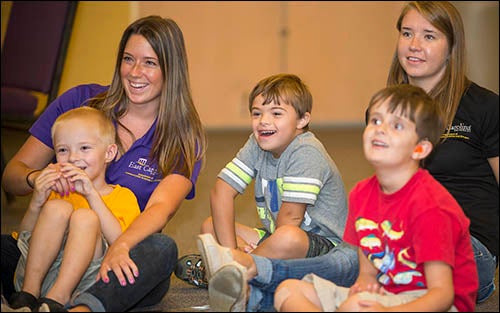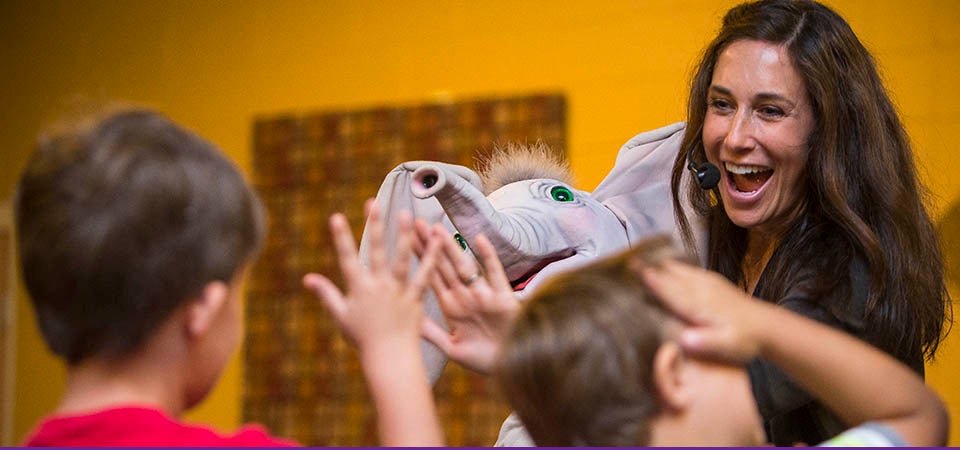‘LIGHT BULB’ MOMENTS’
Summer camp helps children improve communication, social skills
Children with communication delays related to autism and other disorders are learning about making friends while improving their verbal skills at East Carolina University’s Pirate Speech Camp.
Allyson Turnage, a clinical instructor in the Department of Communication Sciences and Disorders in the College of Allied Health Sciences, directs the summer camp. She brings in special guests such as Anna Pridgen, who goes by the name “The Puppet Lady” and teaches life skills to children using puppets, stories and songs.

Campers and counselors enjoy a presentation by The Puppet Lady at Pirate Speech camp. Pictured, left to right, are Carter Thorsen, Ana McConnell, Drew Barefoot, Benjy Langley, and Anna Holland Lawrence.
The enrichment camp expands on what the students learned during the school year by providing a variety of activities which promote communication, social interactions and language development.
The eight campers, whose ages range from four to seven, meet three times a week in space provided by Covenant Church in Greenville. The five-week camp started June 23 and ends July 28.
Each week has featured a new theme upon which activities and lessons are centered.
“The themes this year are zoo animals, space, beach, and safety and community,” said Turnage. “This week a police officer and a fire truck will come to visit.”
A typical camp day starts with circle time, where students learn about a social skill, such as being part of a group, following directions or making friends. A lesson is then taught to incorporate the theme and concept for the week, followed by a hands on activity or craft.
“We play outside on the playground and use great social skills to play with our friends. We have a snack, then each child is taken aside individually to practice the language and social concepts for the week,” said Turnage. The individual practice is important because it is tailored for each child, as some students are higher functioning than others.

A camper at Pirate Speech Camp engages with The Puppet Lady and her dragon puppet.
“Being able to easily communicate is something that the majority of us take for granted,” said Nicole Frisco, one of four camp counselors who are second-year graduate students in communication sciences and disorders.
“As I’ve worked with these children, I’ve started to notice and appreciate the little things. For example, to see two kids that initially had no interest in wanting to interact or play with anyone give each other high fives on the playground, or ask each other if they want to play ball, is such a huge accomplishment.”
The students’ day concludes with a final circle time to review the lesson and say goodbye to their friends.
Turnage said that directing the camp has been a good experience because “it has allowed me to teach graduate level aspiring speech-language pathologists how to effectively work with this unique population. Every day is a new experience and an opportunity to learn. I love seeing the ‘light bulb’ come on when my graduate students and campers learn something new.”
This is the sixth summer that ECU has offered the camp. Though there were a couple of years that the camp was not held, Turnage said the camp will now be offered every summer.
For more information about ECU’s Speech-Language Clinic, go to www.ecu.edu/cs-dhs/csd/slpclinic.cfm.
